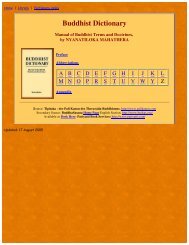Night and Morning with Bhikkhu Tissa
Night and Morning with Bhikkhu Tissa
Night and Morning with Bhikkhu Tissa
- No tags were found...
Create successful ePaper yourself
Turn your PDF publications into a flip-book with our unique Google optimized e-Paper software.
Gene: And what if somebody does believe that liberation is possible?<strong>Bhikkhu</strong> <strong>Tissa</strong>: Well, then, he should try to attain it.Gene: But it seems, Venerable <strong>Tissa</strong>, that a terrific change of mind is required of the ordinary person. Imean, aren’t most of us just looking for a little peace <strong>and</strong> calm right now? Aren’t most of us just hoping forsome mundane prosperity <strong>and</strong> comfort <strong>and</strong> relief from troubles? How many people, after all, are going tofocus all their energies on achieving Nibbána?<strong>Bhikkhu</strong> <strong>Tissa</strong>: The Dhamma is for the happiness <strong>and</strong> peace of living beings here <strong>and</strong> now, as well as inthe future. The basic principles of Dhamma—morality, concentration, <strong>and</strong> wisdom—benefit everyone inperceptible ways. Through observing the moral precepts of not killing, not stealing, not committing sexualmisconduct, not lying, <strong>and</strong> not taking intoxicants, a person keeps himself out of trouble, soothes his mind,acquires a clear conscience, <strong>and</strong> gains the affection <strong>and</strong> respect of others. Through the practice of concentrationhe steadies himself <strong>and</strong> becomes able to act deliberately, <strong>with</strong> clear sight. Through wisdom he realizes howsuffering <strong>and</strong> happiness both come to be. He learns patience <strong>and</strong> detachment. He knows when to speak <strong>and</strong>when to keep quiet. To the degree that a person possesses morality <strong>and</strong> concentration <strong>and</strong> wisdom, he isincreasingly secure in an insecure world. And all of this practice, all of this everyday religious effort, advancesthe practitioner toward the ultimate security, Nibbána. The more he sees the blessings of the Dhamma the morehe will be inspired to exert himself to gain the highest. Besides, there is this to consider: all of us human beingsneed, for our own peace of mind right now, an ideal to give significance to life, an ideal to be revered. And ifwe honestly contemplate our situation we will likely want to set out to reach such an ideal.Gene: That’s true, certainly. It’s true for me. I only wish the way were a little clearer. (He points out thewindow at the scene of misty stillness.) This whole world seems to be covered <strong>with</strong> a confusing mist, like the yardout there.<strong>Bhikkhu</strong> <strong>Tissa</strong>: (Looking out the window): Ah, don’t you think the morning is getting a little brighter? Andas for the way, it’s been marked out very clearly. But making the journey is of course our business <strong>and</strong> ourresponsibility.Gene: That journey might be very long, considering my weaknesses.<strong>Bhikkhu</strong> <strong>Tissa</strong>: Never mind how long. Our task—our useful task—is to act in the light of the Buddha’steaching right now.Gene: The ideal of Nibbána is truly inspiring to me, venerable sir, <strong>and</strong> you’ve convinced me I can’t just sitaround <strong>and</strong> hope. And I realize I have to make the effort myself. But you know, to live in this world I have towork <strong>and</strong> deal <strong>with</strong> other people <strong>and</strong> take care of all sorts of mundane business. This takes up so much time. Iwonder, is it really possible to make progress toward enlightenment in the middle of all these activities? Howexactly can I go about it?<strong>Bhikkhu</strong> <strong>Tissa</strong>: Certainly it’s possible. And the way to go about it is along the Noble Eightfold Path. Thisis the fourth Noble Truth. This path leads to Nibbána, to the complete ending of suffering. We need to make aconscientious effort to apply the factors of this path.Gene: Venerable sir, when I read descriptions of the eight factors I feel like those are mostly virtues that Idon’t have. How do I get from here to there, if you know what I mean?<strong>Bhikkhu</strong> <strong>Tissa</strong>: It’s always good to take a look at the fundamental teachings. The Noble Eightfold Pathconsists of eight factors which we should practice <strong>and</strong> develop, both for peace <strong>and</strong> comfort right now <strong>and</strong> forthe attainment of ultimate liberation. First of all, let’s consider right view. Do you underst<strong>and</strong> what thatmeans?Gene: Well, more or less. It means underst<strong>and</strong>ing cause <strong>and</strong> effect. Seeing things as they really are.<strong>Bhikkhu</strong> <strong>Tissa</strong>: Yes, but there is more to it. Right view is composed of several important kinds ofunderst<strong>and</strong>ing. With respect to kamma, or volitional action, right view is the view that our intentional deedsbring appropriate results to us.Gene: Isn’t this common knowledge?<strong>Bhikkhu</strong> <strong>Tissa</strong>: No. People often seem to think that their deeds, especially their bad ones, simply willdisappear after they’ve been done <strong>and</strong> no longer trouble them. Or they think that once they have justifiedsome action in their own minds it cannot cause them any harm in the future. Of course, this is a wrong idea.16
















